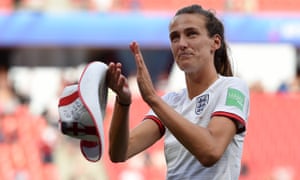'mind gym' helping England at World Cup, says Jill Scott
• ‘Psychological support helped composure against Cameroon’
• ‘Games are going to get even more emotional,’ Scott adds
• ‘Games are going to get even more emotional,’ Scott adds
Sports psychologists still polarise opinion but Jill Scott is a fully subscribed believer. The veteran England midfielder is convinced that hours of work in the Lionesses’ “mind gym” paid dividends as Phil Neville’s players refused to rise to Cameroon’s extraordinary provocations in Valenciennes on Sunday.
“We do a lot of work away from the pitch about conserving emotion at certain times in games and how to always think logically,” Scott said.
“In the round-of-16 win against Cameroon we saw that work actually tested on a football pitch and the girls handled it fantastically. In those moments where you might normally react we didn’t.”
Fifa investigating Cameroon behaviour in World Cup defeat against England
The resultant 3-0 victory has led Neville’s players to Deauville on the Normandy coast where they relaxed on the broad expanse of golden sand beach outside their hotel on Tuesday morning before the start of preparations for Thursday night’s awkward-looking quarter-final against Norway in Le Havre.
“We’ve had some fantastic psychologists over the years,” Scott said. “Under Mark Sampson [the previous manager] we almost did as much work away from the pitch as we did on it but now our new psychologist, Gemma, has come in and carried on with that work with Phil.
“It’s actually in those moments in games like Cameroon, that you realise, that without those meetings, we may have had a completely different scenario. Some people will say experienced players should always be able to handle things, but I’ve never been involved in a game like it in 140 games for England. I’d say those meetings helped us keep our cool on a hot day!”
Under Neville, players can choose how much time they want to spend with the psychologist but group sessions involve role-play scenarios in how to handle highly emotional teammates and opponents.
“We’ve got so many different types of people in the squad,” Scott said. “You might all do the same job when you go to work but everyone’s a different character, a different personality. The meetings are very good because they can help me look at Keira [Walsh, her central midfield partner] and, if she’s having an emotional moment, work out logically how to help her through.
We now know we’ve got a tool in our armoury to help us cope in all situations
Jill Scott
“I think a lot of credit for us coming through against Cameroon should go to the staff who work on our psychological side. From now on the games are going to get even more emotional, they’re going to get even tougher, but we now know we’ve got a tool in our armoury to help us cope in all situations.”
The Manchester City midfielder regards Norway as a cross between two recent opponents. “Cameroon have physicality and Scotland technical ability,” says Scott. “And, if you combine them, then you get a Norway. So it’s going to be difficult.”
After a month together as a squad, and three weeks travelling around France, England are finding things relatively straightforward off the pitch, showing few signs of tournament fatigue. Most players will, almost inevitably, have sporadic wobbles on the road but Scott believes the Lionesses are managing the downs well. “You do go through deep dips,” she acknowledged. “You miss home at times; it’s a long time away. But our mood’s really good.
“Typically you have different groups in the squad that you usually hang around in, which I think is normal in any environment, but, this time, everybody’s spending a lot of time together as a big group.
“It’s important people don’t just look at what we do on the pitch, we have to manage our time away from it, too. It’s a mental battle a lot of the time – it’s how best to use your day off so you train to your full potential afterwards. There’s a lot of very good friendships in the group but sometimes you just need a day away before coming back.”
BHP


